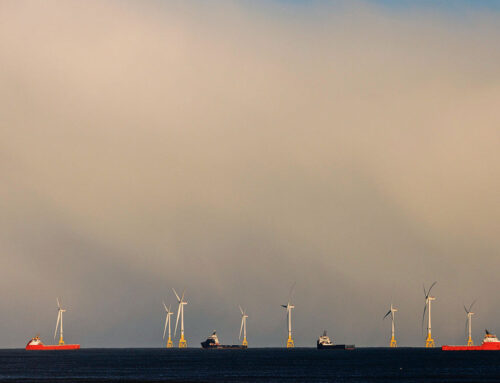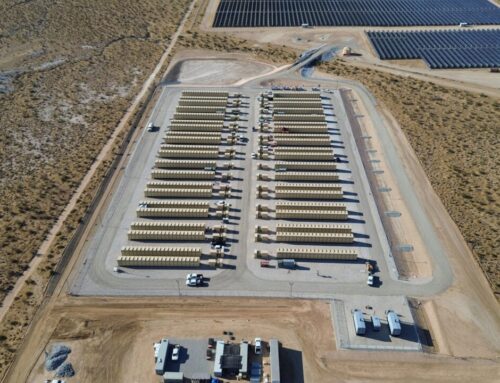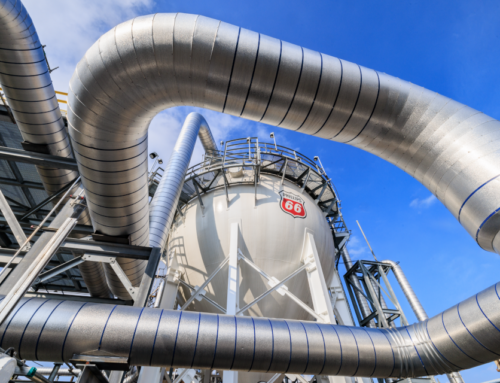In Chicago, a New Food Waste Solution Combines Renewable Energy and Urban Farming
May 7, 2025

Chicago Mayor Brandon Johnson speaks at the opening of the anaerobic digester at the Green Era Campus on Chicago’s South Side. (Image: ROQA Productions via Green Era)
Renewable energy is providing frontline communities with a new paradigm that brings local benefits over and above simply producing power. A new project launched by the Chicago-based nonprofit organization Green Era, for example, demonstrates how biogas production can perform multiple tasks, working as a sustainable food waste solution for local businesses while supporting urban farmers and gardeners as well.
Biogas production at the Green Era Campus in Chicago
Green Era’s signature project is the Green Era Campus, a nine-acre remediated brownfields site located in the Greater Auburn Gresham community on Chicago’s South Side. The power generation part of the site consists of a 35,000-square-foot facility opened last week, where an anaerobic digester has begun using natural microbial action to break down locally-sourced food waste.
Anaerobic digestion is a faster form of organic breakdown. It takes place in enclosed containers, where microbes digest organic material in the absence of oxygen. During the process, the microbes expel biogas which is captured and processed into renewable natural gas, or RNG.
Anaerobic systems have already become commonplace on farms. Farmers can sell their RNG to an existing gas grid or bottler, or it use it themselves on-site. In addition to providing energy for buildings, biomethane from anaerobic digesters can be used as lower-carbon alternative fuel for tractors and other agricultural machinery. As both a food waste and a decarbonization solution, anaerobic systems also prevent the direct methane emissions that can come from decomposing organic waste in traditional compost piles.
Although some have raised concerns over leakage or mismanagement, the evidence indicates that emissions risks can be addressed with appropriate control systems. In addition, a recent environmental justice analysis of dairy farms in California suggests that anaerobic digesters can be adopted for widespread use without a significant impact on local air quality and public health.

From anaerobic digestion to urban agriculture
The digester at Green Era Campus will produce biogas from thousands of tons of food waste annually, drawing from a large supply of local feedstock. According to an estimate cited by Green Era, Chicago generates 451,000 tons of food waste per year.
The nonprofit will focus on collecting inedible food waste that cannot be recovered for food pantries or other direct reuse, Green Era CEO and co-founder Jason Feldman said in a press statement. Along with food scraps, the facility can also accept packaged foods that spoiled too soon at manufacturers, distributors and retailers. The organization is partnering with local municipal agencies, restaurants, food companies, food manufacturers, and residents to supply the digester.
Along with producing biogas, the microbes in the digester system render the organic material in food waste into an inert, nutrient-rich compost — which Green Era plans to use at its seven-acre farm next door. Compost from the digester will also fuel a new 2-acre vertical farm managed by the fellow Chicago nonprofit Urban Growers Collective. Once operational, the vertical farm alone is expected to produce 26,000 pounds of local food per year. The organization also plans to provide compost to other urban farmers at a low price to help offset expenses.
“Our self-sustaining model will produce consistent revenue from compost sales to support the development of a worker-owned cooperative and enable ongoing job creation,” the nonprofit says.

Partnering to repurpose food waste and support food equity
Green Era lists scores of public, private, academic, and nonprofit supporters on its website along with its anchor partner, the Black- and woman-led nonprofit urban agriculture and food equity organization Urban Growers Collective, which is headquartered at the Green Era Campus. “UGC will manage all aspects of the Green Era Campus, including programming, community engagement, garden center, permaculture design, product sales, and more,” Green Era explains.
The Green Era Campus will also support the Collective’s efforts to connect with other food equity organizations in Chicago. On January 2, for example, the Collective announced a partnership with the local nonprofit organization Community Food Navigator, which will bring Navigator’s programs under administration by the Collective.
“Together, UGC and the Navigator will continue the work of engaging, supporting and mobilizing Chicago’s growers, food leaders and educators. This next chapter strengthens our collective efforts to foster food sovereignty and justice in Black, Brown and Indigenous communities,” UGC CEO Erika Allen, who is also the co-founder of Green Era, said in a statement.
Beyond Chicago, Green Era also aims to provide communities across the nation with an example of a sustainable alternative to the destructive “drill, baby, drill” mindset that offers local communities and businesses new opportunities for job creation and economic development while also producing renewable energy, too.
Search
RECENT PRESS RELEASES
Related Post



